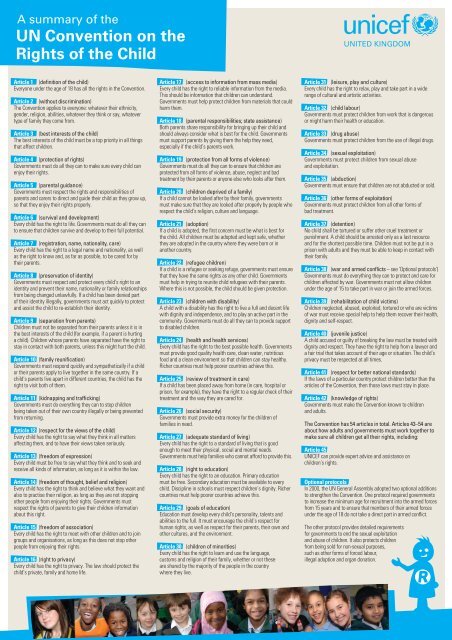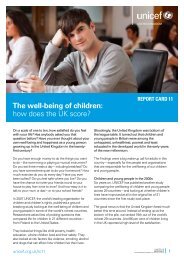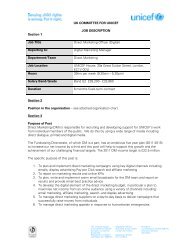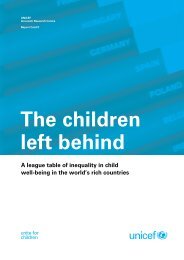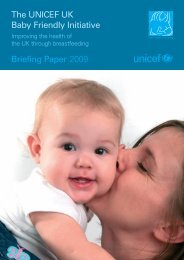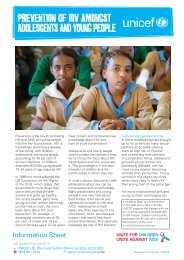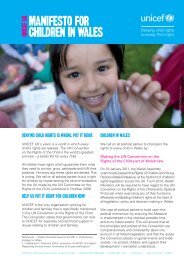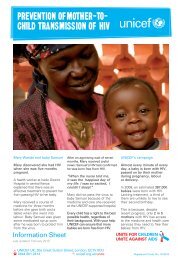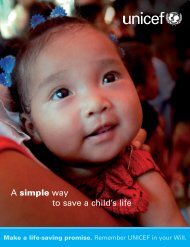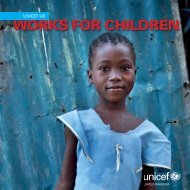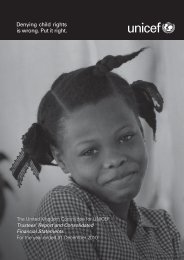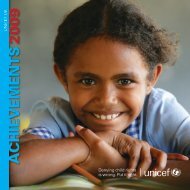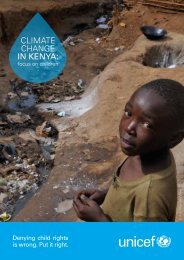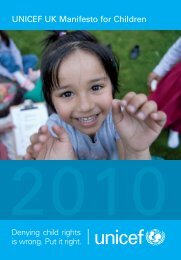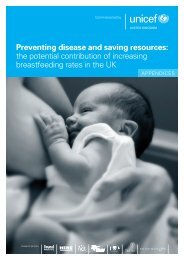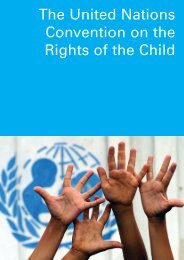UN Convention on the Rights of the Child - Unicef UK
UN Convention on the Rights of the Child - Unicef UK
UN Convention on the Rights of the Child - Unicef UK
Create successful ePaper yourself
Turn your PDF publications into a flip-book with our unique Google optimized e-Paper software.
A summary <strong>of</strong> <strong>the</strong><br />
<str<strong>on</strong>g>UN</str<strong>on</strong>g> <str<strong>on</strong>g>C<strong>on</strong>venti<strong>on</strong></str<strong>on</strong>g> <strong>on</strong> <strong>the</strong><br />
<strong>Rights</strong> <strong>of</strong> <strong>the</strong> <strong>Child</strong><br />
existing<br />
Article 1 (definiti<strong>on</strong> <strong>of</strong> <strong>the</strong> child)<br />
Every<strong>on</strong>e under <strong>the</strong> age <strong>of</strong> 18 has all <strong>the</strong> rights in <strong>the</strong> <str<strong>on</strong>g>C<strong>on</strong>venti<strong>on</strong></str<strong>on</strong>g>.<br />
Article 2 (without discriminati<strong>on</strong>)<br />
The <str<strong>on</strong>g>C<strong>on</strong>venti<strong>on</strong></str<strong>on</strong>g> applies to every<strong>on</strong>e: whatever <strong>the</strong>ir ethnicity,<br />
gender, religi<strong>on</strong>, abilities, whatever <strong>the</strong>y think or say, whatever<br />
type <strong>of</strong> family <strong>the</strong>y come from.<br />
Article 3 (best interests <strong>of</strong> <strong>the</strong> child)<br />
The best interests <strong>of</strong> <strong>the</strong> child must be a top priority in all things<br />
that affect children.<br />
Article 4 (protecti<strong>on</strong> <strong>of</strong> rights)<br />
Governments must do all <strong>the</strong>y can to make sure every child can<br />
enjoy <strong>the</strong>ir rights.<br />
Article 5 (parental guidance)<br />
Governments must respect <strong>the</strong> rights and resp<strong>on</strong>sibilities <strong>of</strong><br />
parents and carers to direct and guide <strong>the</strong>ir child as <strong>the</strong>y grow up,<br />
so that <strong>the</strong>y enjoy <strong>the</strong>ir rights properly.<br />
Article 6 (survival and development)<br />
Every child has <strong>the</strong> right to life. Governments must do all <strong>the</strong>y can<br />
to ensure that children survive and develop to <strong>the</strong>ir full potential.<br />
Article 7 (registrati<strong>on</strong>, name, nati<strong>on</strong>ality, care)<br />
Every child has <strong>the</strong> right to a legal name and nati<strong>on</strong>ality, as well<br />
as <strong>the</strong> right to know and, as far as possible, to be cared for by<br />
<strong>the</strong>ir parents.<br />
Article 8 (preservati<strong>on</strong> <strong>of</strong> identity)<br />
Governments must respect and protect every child’s right to an<br />
identity and prevent <strong>the</strong>ir name, nati<strong>on</strong>ality or family relati<strong>on</strong>ships<br />
from being changed unlawfully. If a child has been denied part<br />
<strong>of</strong> <strong>the</strong>ir identity illegally, governments must act quickly to protect<br />
and assist <strong>the</strong> child to re-establish <strong>the</strong>ir identity.<br />
Article 9 (separati<strong>on</strong> from parents)<br />
<strong>Child</strong>ren must not be separated from <strong>the</strong>ir parents unless it is in<br />
<strong>the</strong> best interests <strong>of</strong> <strong>the</strong> child (for example, if a parent is hurting<br />
a child). <strong>Child</strong>ren whose parents have separated have <strong>the</strong> right to<br />
stay in c<strong>on</strong>tact with both parents, unless this might hurt <strong>the</strong> child.<br />
Article 10 (family reunificati<strong>on</strong>)<br />
Governments must resp<strong>on</strong>d quickly and sympa<strong>the</strong>tically if a child<br />
or <strong>the</strong>ir parents apply to live toge<strong>the</strong>r in <strong>the</strong> same country. If a<br />
child’s parents live apart in different countries, <strong>the</strong> child has <strong>the</strong><br />
right to visit both <strong>of</strong> <strong>the</strong>m.<br />
Article 11 (kidnapping and trafficking)<br />
Governments must do everything <strong>the</strong>y can to stop children<br />
being taken out <strong>of</strong> <strong>the</strong>ir own country illegally or being prevented<br />
from returning.<br />
Article 12 (respect for <strong>the</strong> views <strong>of</strong> <strong>the</strong> child)<br />
Every child has <strong>the</strong> right to say what <strong>the</strong>y think in all matters<br />
affecting <strong>the</strong>m, and to have <strong>the</strong>ir views taken seriously.<br />
Article 13 (freedom <strong>of</strong> expressi<strong>on</strong>)<br />
Every child must be free to say what <strong>the</strong>y think and to seek and<br />
receive all kinds <strong>of</strong> informati<strong>on</strong>, as l<strong>on</strong>g as it is within <strong>the</strong> law.<br />
Article 14 (freedom <strong>of</strong> thought, belief and religi<strong>on</strong>)<br />
Every child has <strong>the</strong> right to think and believe what <strong>the</strong>y want and<br />
also to practise <strong>the</strong>ir religi<strong>on</strong>, as l<strong>on</strong>g as <strong>the</strong>y are not stopping<br />
o<strong>the</strong>r people from enjoying <strong>the</strong>ir rights. Governments must<br />
respect <strong>the</strong> rights <strong>of</strong> parents to give <strong>the</strong>ir children informati<strong>on</strong><br />
about this right.<br />
Article 15 (freedom <strong>of</strong> associati<strong>on</strong>)<br />
Every child has <strong>the</strong> right to meet with o<strong>the</strong>r children and to join<br />
groups and organisati<strong>on</strong>s, as l<strong>on</strong>g as this does not stop o<strong>the</strong>r<br />
people from enjoying <strong>the</strong>ir rights.<br />
Article 16 (right to privacy)<br />
Every child has <strong>the</strong> right to privacy. The law should protect <strong>the</strong><br />
child’s private, family and home life.<br />
Article 17 (access to informati<strong>on</strong> from mass media)<br />
Every child has <strong>the</strong> right to reliable informati<strong>on</strong> from <strong>the</strong> media.<br />
This should be informati<strong>on</strong> that children can understand.<br />
Governments must help protect children from materials that could<br />
harm <strong>the</strong>m.<br />
Article 18 (parental resp<strong>on</strong>sibilities; state assistance)<br />
Both parents share resp<strong>on</strong>sibility for bringing up <strong>the</strong>ir child and<br />
should always c<strong>on</strong>sider what is best for <strong>the</strong> child. Governments<br />
must support parents by giving <strong>the</strong>m <strong>the</strong> help <strong>the</strong>y need,<br />
especially if <strong>the</strong> child’s parents work.<br />
Article 19 (protecti<strong>on</strong> from all forms <strong>of</strong> violence)<br />
Governments must do all <strong>the</strong>y can to ensure that children are<br />
protected from all forms <strong>of</strong> violence, abuse, neglect and bad<br />
treatment by <strong>the</strong>ir parents or any<strong>on</strong>e else who looks after <strong>the</strong>m.<br />
Article 20 (children deprived <strong>of</strong> a family)<br />
If a child cannot be looked after by <strong>the</strong>ir family, governments<br />
must make sure that <strong>the</strong>y are looked after properly by people who<br />
respect <strong>the</strong> child’s religi<strong>on</strong>, culture and language.<br />
Article 21 (adopti<strong>on</strong>)<br />
If a child is adopted, <strong>the</strong> first c<strong>on</strong>cern must be what is best for<br />
<strong>the</strong> child. All children must be adopted and kept safe, whe<strong>the</strong>r<br />
<strong>the</strong>y are adopted in <strong>the</strong> country where <strong>the</strong>y were born or in<br />
ano<strong>the</strong>r country.<br />
Article 22 (refugee children)<br />
If a child is a refugee or seeking refuge, governments must ensure<br />
that <strong>the</strong>y have <strong>the</strong> same rights as any o<strong>the</strong>r child. Governments<br />
must help in trying to reunite child refugees with <strong>the</strong>ir parents.<br />
Where this is not possible, <strong>the</strong> child should be given protecti<strong>on</strong>.<br />
Article 23 (children with disability)<br />
A child with a disability has <strong>the</strong> right to live a full and decent life<br />
with dignity and independence, and to play an active part in <strong>the</strong><br />
community. Governments must do all <strong>the</strong>y can to provide support<br />
to disabled children.<br />
Article 24 (health and health services)<br />
Every child has <strong>the</strong> right to <strong>the</strong> best possible health. Governments<br />
must provide good quality health care, clean water, nutritious<br />
food and a clean envir<strong>on</strong>ment so that children can stay healthy.<br />
Richer countries must help poorer countries achieve this.<br />
Article 25 (review <strong>of</strong> treatment in care)<br />
If a child has been placed away from home (in care, hospital or<br />
pris<strong>on</strong>, for example), <strong>the</strong>y have <strong>the</strong> right to a regular check <strong>of</strong> <strong>the</strong>ir<br />
treatment and <strong>the</strong> way <strong>the</strong>y are cared for.<br />
Article 26 (social security)<br />
Governments must provide extra m<strong>on</strong>ey for <strong>the</strong> children <strong>of</strong><br />
families in need.<br />
Article 27 (adequate standard <strong>of</strong> living)<br />
Every child has <strong>the</strong> right to a standard <strong>of</strong> living that is good<br />
enough to meet <strong>the</strong>ir physical, social and mental needs.<br />
Governments must help families who cannot afford to provide this.<br />
Article 28 (right to educati<strong>on</strong>)<br />
Every child has <strong>the</strong> right to an educati<strong>on</strong>. Primary educati<strong>on</strong><br />
must be free. Sec<strong>on</strong>dary educati<strong>on</strong> must be available to every<br />
child. Discipline in schools must respect children’s dignity. Richer<br />
countries must help poorer countries achieve this.<br />
Article 29 (goals <strong>of</strong> educati<strong>on</strong>)<br />
Educati<strong>on</strong> must develop every child’s pers<strong>on</strong>ality, talents and<br />
abilities to <strong>the</strong> full. It must encourage <strong>the</strong> child’s respect for<br />
human rights, as well as respect for <strong>the</strong>ir parents, <strong>the</strong>ir own and<br />
o<strong>the</strong>r cultures, and <strong>the</strong> envir<strong>on</strong>ment.<br />
Article 30 (children <strong>of</strong> minorities)<br />
Every child has <strong>the</strong> right to learn and use <strong>the</strong> language,<br />
customs and religi<strong>on</strong> <strong>of</strong> <strong>the</strong>ir family, whe<strong>the</strong>r or not <strong>the</strong>se<br />
are shared by <strong>the</strong> majority <strong>of</strong> <strong>the</strong> people in <strong>the</strong> country<br />
where <strong>the</strong>y live.<br />
Article 31 (leisure, play and culture)<br />
Every child has <strong>the</strong> right to relax, play and take part in a wide<br />
range <strong>of</strong> cultural and artistic activities.<br />
Article 32 (child labour)<br />
Governments must protect children from work that is dangerous<br />
or might harm <strong>the</strong>ir health or educati<strong>on</strong>.<br />
Article 33 (drug abuse)<br />
Governments must protect children from <strong>the</strong> use <strong>of</strong> illegal drugs.<br />
Article 34 (sexual exploitati<strong>on</strong>)<br />
Governments must protect children from sexual abuse<br />
and exploitati<strong>on</strong>.<br />
Article 35 (abducti<strong>on</strong>)<br />
Governments must ensure that children are not abducted or sold.<br />
Article 36 (o<strong>the</strong>r forms <strong>of</strong> exploitati<strong>on</strong>)<br />
Governments must protect children from all o<strong>the</strong>r forms <strong>of</strong><br />
bad treatment.<br />
Article 37 (detenti<strong>on</strong>)<br />
No child shall be tortured or suffer o<strong>the</strong>r cruel treatment or<br />
punishment. A child should be arrested <strong>on</strong>ly as a last resource<br />
and for <strong>the</strong> shortest possible time. <strong>Child</strong>ren must not be put in a<br />
pris<strong>on</strong> with adults and <strong>the</strong>y must be able to keep in c<strong>on</strong>tact with<br />
<strong>the</strong>ir family.<br />
Article 38 (war and armed c<strong>on</strong>flicts – see ‘Opti<strong>on</strong>al protocols’)<br />
Governments must do everything <strong>the</strong>y can to protect and care for<br />
children affected by war. Governments must not allow children<br />
under <strong>the</strong> age <strong>of</strong> 15 to take part in war or join <strong>the</strong> armed forces.<br />
Article 39 (rehabilitati<strong>on</strong> <strong>of</strong> child victims)<br />
<strong>Child</strong>ren neglected, abused, exploited, tortured or who are victims<br />
<strong>of</strong> war must receive special help to help <strong>the</strong>m recover <strong>the</strong>ir health,<br />
dignity and self-respect.<br />
Article 40 (juvenile justice)<br />
A child accused or guilty <strong>of</strong> breaking <strong>the</strong> law must be treated with<br />
dignity and respect. They have <strong>the</strong> right to help from a lawyer and<br />
a fair trial that takes account <strong>of</strong> <strong>the</strong>ir age or situati<strong>on</strong>. The child’s<br />
privacy must be respected at all times.<br />
Article 41 (respect for better nati<strong>on</strong>al standards)<br />
If <strong>the</strong> laws <strong>of</strong> a particular country protect children better than <strong>the</strong><br />
articles <strong>of</strong> <strong>the</strong> <str<strong>on</strong>g>C<strong>on</strong>venti<strong>on</strong></str<strong>on</strong>g>, <strong>the</strong>n those laws must stay in place.<br />
Article 42 (knowledge <strong>of</strong> rights)<br />
Governments must make <strong>the</strong> <str<strong>on</strong>g>C<strong>on</strong>venti<strong>on</strong></str<strong>on</strong>g> known to children<br />
and adults.<br />
The <str<strong>on</strong>g>C<strong>on</strong>venti<strong>on</strong></str<strong>on</strong>g> has 54 articles in total. Articles 43–54 are<br />
about how adults and governments must work toge<strong>the</strong>r to<br />
make sure all children get all <strong>the</strong>ir rights, including:<br />
Article 45<br />
<str<strong>on</strong>g>UN</str<strong>on</strong>g>ICEF can provide expert advice and assistance <strong>on</strong><br />
children’s rights.<br />
Opti<strong>on</strong>al protocols<br />
In 2000, <strong>the</strong> <str<strong>on</strong>g>UN</str<strong>on</strong>g> General Assembly adopted two opti<strong>on</strong>al additi<strong>on</strong>s<br />
to streng<strong>the</strong>n <strong>the</strong> <str<strong>on</strong>g>C<strong>on</strong>venti<strong>on</strong></str<strong>on</strong>g>. One protocol required governments<br />
to increase <strong>the</strong> minimum age for recruitment into <strong>the</strong> armed forces<br />
from 15 years and to ensure that members <strong>of</strong> <strong>the</strong>ir armed forces<br />
under <strong>the</strong> age <strong>of</strong> 18 do not take a direct part in armed c<strong>on</strong>flict.<br />
The o<strong>the</strong>r protocol provides detailed requirements<br />
for governments to end <strong>the</strong> sexual exploitati<strong>on</strong><br />
and abuse <strong>of</strong> children. It also protects children<br />
from being sold for n<strong>on</strong>-sexual purposes,<br />
such as o<strong>the</strong>r forms <strong>of</strong> forced labour,<br />
illegal adopti<strong>on</strong> and organ d<strong>on</strong>ati<strong>on</strong>.<br />
CRCSummary_2012.indd 1<br />
8/7/12 4:19 PM
R R<br />
existing<br />
<str<strong>on</strong>g>UN</str<strong>on</strong>g>ICEF is <strong>the</strong> world’s leading<br />
organisati<strong>on</strong> working for children and<br />
<strong>the</strong>ir rights.<br />
Find out more about <str<strong>on</strong>g>UN</str<strong>on</strong>g>ICEF <strong>UK</strong>’s<br />
<strong>Rights</strong> Respecting School Award<br />
unicef.org.uk/rrsa<br />
<str<strong>on</strong>g>UN</str<strong>on</strong>g>ICEF works with families, local<br />
communities, partners and governments<br />
in more than 190 countries to help<br />
every child survive and thrive. The <str<strong>on</strong>g>UN</str<strong>on</strong>g><br />
<str<strong>on</strong>g>C<strong>on</strong>venti<strong>on</strong></str<strong>on</strong>g> <strong>on</strong> <strong>the</strong> <strong>Rights</strong> <strong>of</strong> <strong>the</strong> <strong>Child</strong><br />
guides all our work.<br />
We help build a better world for children.<br />
Our focus is children who need <strong>the</strong> most<br />
help. We also help when emergencies, such<br />
as earthquakes and wars, affect children.<br />
We receive no funding from <strong>the</strong> <str<strong>on</strong>g>UN</str<strong>on</strong>g><br />
budget. Most <strong>of</strong> our m<strong>on</strong>ey comes from<br />
people, companies and o<strong>the</strong>r bodies.<br />
Governments in <strong>the</strong> countries where<br />
<str<strong>on</strong>g>UN</str<strong>on</strong>g>ICEF works also provide m<strong>on</strong>ey and<br />
<strong>the</strong> people work in partnership with us.<br />
Teachers can access classroom<br />
resources about children’s rights at<br />
unicef.org.uk/educati<strong>on</strong><br />
Find out about our schools’ fundraising<br />
initiative at dayforchange.org.uk<br />
This is a summary versi<strong>on</strong> <strong>of</strong> <strong>the</strong> <str<strong>on</strong>g>UN</str<strong>on</strong>g><br />
<str<strong>on</strong>g>C<strong>on</strong>venti<strong>on</strong></str<strong>on</strong>g> <strong>on</strong> <strong>the</strong> <strong>Rights</strong> <strong>of</strong> <strong>the</strong> <strong>Child</strong>.<br />
For <strong>the</strong> full text, please visit<br />
unicef.org.uk/crc<br />
For fur<strong>the</strong>r copies <strong>of</strong> this leaflet, please<br />
go <strong>on</strong>line unicef.org.uk/32910 or call<br />
<strong>the</strong> <str<strong>on</strong>g>UN</str<strong>on</strong>g>ICEF Educati<strong>on</strong> Order Line <strong>on</strong><br />
0844 801 2413 quoting code 32910P.<br />
A summary <strong>of</strong> <strong>the</strong><br />
<str<strong>on</strong>g>UN</str<strong>on</strong>g> <str<strong>on</strong>g>C<strong>on</strong>venti<strong>on</strong></str<strong>on</strong>g> <strong>on</strong> <strong>the</strong><br />
<strong>Rights</strong> <strong>of</strong> <strong>the</strong> <strong>Child</strong><br />
The <str<strong>on</strong>g>UN</str<strong>on</strong>g> <str<strong>on</strong>g>C<strong>on</strong>venti<strong>on</strong></str<strong>on</strong>g> <strong>on</strong> <strong>the</strong> <strong>Rights</strong> <strong>of</strong> <strong>the</strong> <strong>Child</strong> is <strong>the</strong> most widely<br />
ratified human rights treaty in history. It was adopted by <strong>the</strong> <str<strong>on</strong>g>UN</str<strong>on</strong>g><br />
General Assembly in 1989 and ratified by <strong>the</strong> <strong>UK</strong> in 1991.<br />
Article 42 (knowledge <strong>of</strong> rights) – Governments must make<br />
<strong>the</strong> <str<strong>on</strong>g>C<strong>on</strong>venti<strong>on</strong></str<strong>on</strong>g> known to children and adults.<br />
Produced in c<strong>on</strong>sultati<strong>on</strong> with young people<br />
All images © <str<strong>on</strong>g>UN</str<strong>on</strong>g>ICEF <strong>UK</strong>/2009/Howard Davies<br />
<str<strong>on</strong>g>UN</str<strong>on</strong>g>ICEF <strong>UK</strong>, Registered Charity No. 1072612<br />
Printed <strong>on</strong> 100 per cent recycled paper<br />
A BETTER LIFE<br />
FOR EVERYONE<br />
existing<br />
unicef.org.uk<br />
WHAT IS THE <str<strong>on</strong>g>UN</str<strong>on</strong>g> CONVENTION ON THE RIGHTS OF THE CHILD?<br />
THE ROLE OF CHILDREN AND YO<str<strong>on</strong>g>UN</str<strong>on</strong>g>G PEOPLE<br />
The <str<strong>on</strong>g>UN</str<strong>on</strong>g> <str<strong>on</strong>g>C<strong>on</strong>venti<strong>on</strong></str<strong>on</strong>g> <strong>on</strong> <strong>the</strong> <strong>Rights</strong> <strong>of</strong> <strong>the</strong> <strong>Child</strong> sets out <strong>the</strong> rights <strong>of</strong> every<br />
pers<strong>on</strong> under 18 and how those rights should be met. It is an internati<strong>on</strong>al<br />
statement <strong>of</strong> <strong>the</strong> civil, political, ec<strong>on</strong>omic, social and cultural rights <strong>of</strong> children.<br />
The <str<strong>on</strong>g>UN</str<strong>on</strong>g> General Assembly adopted <strong>the</strong> <str<strong>on</strong>g>C<strong>on</strong>venti<strong>on</strong></str<strong>on</strong>g> <strong>on</strong> 20 November 1989 and<br />
it was ratified by <strong>the</strong> United Kingdom in 1991.<br />
<str<strong>on</strong>g>UN</str<strong>on</strong>g>ICEF is <strong>the</strong> <strong>on</strong>ly organisati<strong>on</strong> (o<strong>the</strong>r than <strong>the</strong> <str<strong>on</strong>g>UN</str<strong>on</strong>g> itself) whose name appears in<br />
<strong>the</strong> <str<strong>on</strong>g>C<strong>on</strong>venti<strong>on</strong></str<strong>on</strong>g>. The principles and values <strong>of</strong> <strong>the</strong> <str<strong>on</strong>g>C<strong>on</strong>venti<strong>on</strong></str<strong>on</strong>g> underpin all our work.<br />
THE CONVENTION AND THE ROLE OF ADULTS<br />
In order to enjoy <strong>the</strong>ir rights fully as <strong>the</strong>y grow and develop, all children and young<br />
people will:<br />
• learn about <strong>the</strong> <str<strong>on</strong>g>C<strong>on</strong>venti<strong>on</strong></str<strong>on</strong>g> and how it applies equally to every child and young<br />
pers<strong>on</strong> around <strong>the</strong> world.<br />
• make <strong>the</strong> most <strong>of</strong> <strong>the</strong>ir opportunities to fulfil <strong>the</strong>ir rights to an educati<strong>on</strong>, to be<br />
safe, to be healthy, to be treated fairly, and to have a voice in decisi<strong>on</strong>s that<br />
affect <strong>the</strong>m, and to encourage o<strong>the</strong>rs to do <strong>the</strong> same.<br />
• do what <strong>the</strong>y can to act in ways that will enable o<strong>the</strong>r children and young<br />
people, locally and globally, to enjoy <strong>the</strong>ir rights.<br />
The rights set out in <strong>the</strong> <str<strong>on</strong>g>C<strong>on</strong>venti<strong>on</strong></str<strong>on</strong>g> and summarised over <strong>the</strong> page imply a duty<br />
<strong>on</strong> adults to ensure that <strong>the</strong>se rights are realised. If all children and young people<br />
are to fulfil <strong>the</strong>ir potential and learn in rights-respecting envir<strong>on</strong>ments, <strong>the</strong>n adults<br />
have a resp<strong>on</strong>sibility to model rights-respecting behaviour:<br />
• The government and its departments (including local authorities and schools)<br />
need to make <strong>the</strong> <str<strong>on</strong>g>C<strong>on</strong>venti<strong>on</strong></str<strong>on</strong>g> known to all children, young people, parents,<br />
carers and <strong>the</strong> community as a whole.<br />
• Every<strong>on</strong>e working with children and young people needs to be fully aware <strong>of</strong> <strong>the</strong><br />
<str<strong>on</strong>g>C<strong>on</strong>venti<strong>on</strong></str<strong>on</strong>g> and ensure that it informs <strong>the</strong>ir policies and underpins <strong>the</strong>ir practice.<br />
• Parents and carers are resp<strong>on</strong>sible for ensuring that <strong>the</strong>y model rights-respecting<br />
behaviour in bringing up <strong>the</strong>ir children.<br />
• Schools are resp<strong>on</strong>sible for promoting a rights-respecting envir<strong>on</strong>ment and for<br />
developing an understanding that rights apply equally to every<strong>on</strong>e globally.<br />
• <strong>Child</strong>ren and young people should be given opportunities to learn about <strong>the</strong> wider<br />
world and understand how <strong>the</strong>y can act to ensure every<strong>on</strong>e can fulfil <strong>the</strong>ir rights.<br />
WHAT IS THE RIGHTS RESPECTING SCHOOL AWARD?<br />
<str<strong>on</strong>g>UN</str<strong>on</strong>g>ICEF <strong>UK</strong>’s <strong>Rights</strong> Respecting School Award (RRSA) recognises achievement in<br />
putting <strong>the</strong> <str<strong>on</strong>g>C<strong>on</strong>venti<strong>on</strong></str<strong>on</strong>g> at <strong>the</strong> heart <strong>of</strong> a school’s ethos. The RRSA standards cover<br />
four key areas:<br />
• Leading and managing a rights-respecting school.<br />
• Teaching and learning about <strong>the</strong> <str<strong>on</strong>g>C<strong>on</strong>venti<strong>on</strong></str<strong>on</strong>g>.<br />
• Creating and maintaining a rights-respecting ethos.<br />
R RR R<br />
• Empowering children and young people to become active citizens and learners.<br />
The Award scheme is an effective way <strong>of</strong> inspiring and supporting schools who<br />
want to provide children, young people and <strong>the</strong> wider school community with a<br />
rights-respecting guide to living. It also provides a framework to<br />
c<strong>on</strong>nect a range <strong>of</strong> school initiatives that are intended to<br />
promote <strong>the</strong> rights <strong>of</strong> children and young people.<br />
CRCSummary_2012.indd 2<br />
8/7/12 4:19 PM


